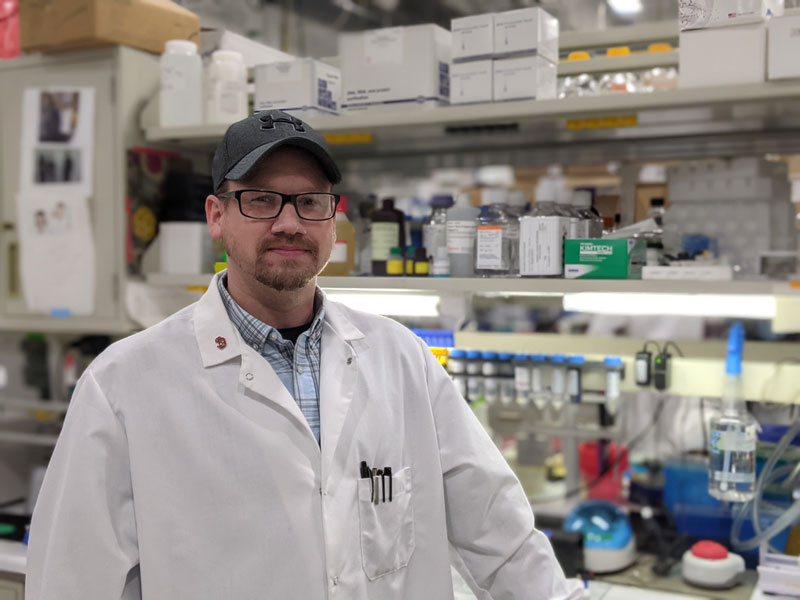Sanford Research graduate student Brook Busselman did not follow the conventional education timeline that many students pursue. Rather, his life experiences helped guide him to his true passion: biomedical research.
Following high school, Busselman said that he essentially “lived an entire life,” by getting married and having a career for 13 years before pursuing a college degree.
Apply now: Graduate programs at Sanford Research
Coming out of high school, he saw a lot of his friends and peers jumping into different jobs and college programs.
“I was one of the people that had no idea what I wanted to do or even to figure out how to learn what you wanted to do,” he said.
One thing Busselman did know was that he wanted to better himself, contribute to society, and provide for his family. How he did that would be a journey of curiosity and self-discovery.
Taking the time to try
After tossing around the idea of being a dentist, pilot, doctor, or joining the military, Busselman took a step back to ask, “what am I interested in and what is the furthest that I can go in that career?”
He ultimately realized that he had a particular interest in first aid, especially after having kids. Busselman began by taking emergency medical technician classes, but soon realized he wanted something else.
He then attended paramedic school in the evenings and on weekends, while continuing to work as an EMT and mechanic while maintaining his roles as a father and husband. As is the trend for Busselman, he was already thinking of what the next step was for him on this journey. He enjoyed working as a paramedic, but considered going back for his bachelor’s degree to prepare him for a career in the health sciences.
After starting his undergraduate degree, he quickly realized that modern medicine is “evidence-based medicine and it is driven by research,” he said.
“Naturally I wanted to learn about that because you can only implement best practice. You can’t just make it up as you go when you’re a doctor.”
Puzzle pieces coming together
As Busselman began to shift gears and focus his interest on research, he found a position working in a research lab at the Graduate Education and Applied Research Center on the University Center campus in Sioux Falls, South Dakota.
He found a passion for research. He loved the process of discovering how things worked and how they could be applied to move science forward. He started to look for graduate programs around the region, knowing that he was limited geographically because his family had planted roots in Sioux Falls. Little did he know the research opportunities that existed in his own backyard.
The University of South Dakota’s Basic Biomedical Sciences program caught his attention from the start. After applying, he realized the specific research opportunities offered at Sanford Research and was intrigued by the numerous fields of study that would be at his fingertips.
Finding a home at Sanford Research
Busselman spent his first year of the program rotating through three research laboratories before ultimately choosing a dissertation lab. He is thankful for the experiences and opportunities that he received during his rotations, and is glad to have the additional mentorship from his rotation advisors as he continues his work at Sanford Research.
While he is now a third year Ph.D. student in the program and is working on his dissertation project in the Chandrasekar Lab, he knows that the mentorship he receives from everyone at Sanford Research is instrumental in his professional and personal development.
“I worried, not knowing anybody that was in science,” he said. “Are these all uptight people that get frustrated when you don’t know something or ask a question? That was never an issue for me. As long as I am clear about what I know and what I don’t know, I am always able to receive the help that I need.”
While Busselman’s path to graduate school is seen by many as “nontraditional,” his unending curiosity and passion for research are not. With about 2-1/2 years remaining in his graduate work, Busselman is already looking forward to the next step in his career. After completing his graduate training, he plans to work in the field of biochemistry to continue making cutting edge discoveries while improving patient health.
Learn more
- First-generation Cuban American researcher aims to give back
- Research student benefits from engineering perspective
- Aspiring doctor values research experience at Sanford lab
- COVID-19 Q&A: Sanford Research on clinical trials, vaccines
…
Posted In People & Culture, Postgraduate Programs, Research, Sanford Stories
